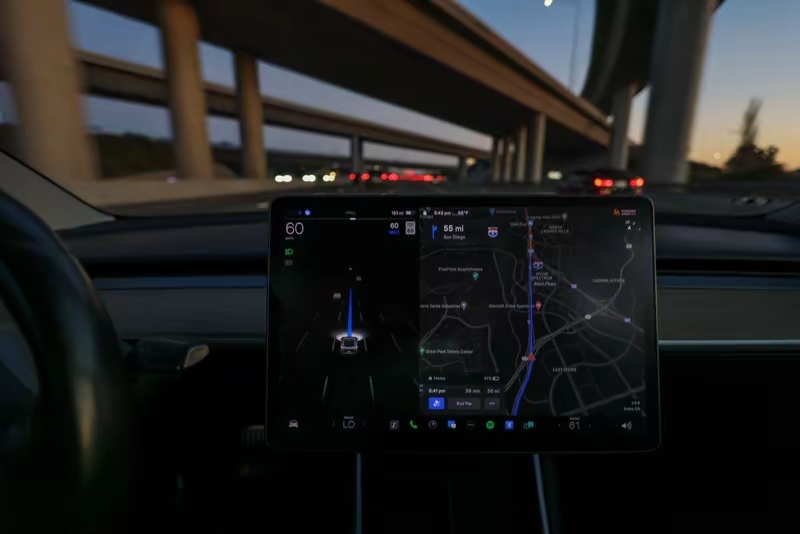
Recently, the AI team released a global deployment roadmap for Tesla's FSD (fully autonomous driving) feature through their official social media account, with plans to launch FSD functionality in the Chinese and European markets in the first quarter of 2025. This news has undoubtedly attracted widespread attention and discussion.
The launch of FSD function is expected to completely change people's mode of transportation. Fully autonomous driving will make driving easier and safer, reducing traffic accidents caused by human factors. Passengers can freely work, study or entertain themselves in the car, improving the efficiency and comfort of travel. In addition, autonomous driving technology can optimize traffic flow, reduce congestion, lower energy consumption and environmental pollution.
For Tesla, the global deployment of FSD functionality will further enhance its competitiveness in the automotive industry. As a leading global electric vehicle manufacturer, Tesla has been committed to promoting the development of autonomous driving technology. The launch of FSD functionality will make its products more technologically advanced, attracting more consumer attention and purchases. At the same time, this will also encourage other car manufacturers to increase their investment in research and development of autonomous driving technology, promoting technological progress in the entire automotive industry.
The implementation of FSD function requires a large number of sensors, chips, software and other technical support, which will drive the development of related industries. For example, sensor manufacturers can provide high-precision sensors for autonomous vehicle, chip manufacturers can develop more powerful computing chips, and software developers can develop more intelligent autonomous driving algorithms. In addition, autonomous driving technology will also promote the development of intelligent transportation systems, shared mobility, and other fields, bringing new impetus to economic growth.
Although Tesla has made some progress in autonomous driving technology, the technical reliability of the FSD function remains a highly concerned issue. Autonomous driving technology requires accurate perception of the surrounding environment, decision-making, and control of vehicle movement in various complex road conditions and environments, which places extremely high demands on the accuracy and stability of the technology. At present, there are still some limitations to autonomous driving technology, such as decreased performance in harsh weather conditions and insufficient processing capabilities for complex traffic scenarios. If there is a technical malfunction in the FSD function in practical applications, it may lead to serious traffic accidents and cause huge losses to users and society.
The development of autonomous driving technology has also brought about a series of legal, regulatory, and supervisory issues. At present, the laws, regulations and regulatory policies for autonomous vehicle in various countries are not perfect, and there are many uncertainties. For example, the liability determination, insurance system, data security and other issues of autonomous vehicle need to be further clarified and standardized. During the global deployment of FSD functionality, Tesla needs to work closely with governments and regulatory agencies in various countries to ensure that its products comply with local laws, regulations, and regulatory requirements. Otherwise, there may be legal risks and regulatory pressures.
The promotion of fully autonomous driving technology still faces the issue of public acceptance. Despite the many advantages of autonomous driving technology, many people still have doubts about its safety and reliability. In addition, some people may be concerned that autonomous driving technology may lead to a reduction in employment opportunities and have an impact on social stability. Tesla needs to strengthen publicity and education to increase public awareness and understanding of autonomous driving technology, and enhance public confidence and acceptance.
Tesla should continue to increase its investment in the research and development of autonomous driving technology, and improve the technical reliability and stability of the FSD function. We can work together with universities, research institutions, and other enterprises to overcome the challenges of autonomous driving technology. At the same time, Tesla should strengthen testing and validation of its autonomous driving technology to ensure the safety and reliability of its products in practical applications.
We should also actively participate in the formulation of laws and regulations by governments and regulators of all countries, and provide reasonable policy recommendations for the development of autonomous vehicle. Through cooperation with industry associations, experts and scholars, we can jointly promote the improvement of laws, regulations and regulatory policies for autonomous vehicle. At the same time, Tesla should strengthen communication and cooperation with the government and regulatory agencies, timely understand policy developments, and adjust the company's development strategy.

On January 7th local time, GameStop (GME.US) announced that the company's board of directors had approved a potential executive compensation package worth $3.54 billion, which was targeted at the company's CEO, Ryan Cohen. At the same time, this new compensation package set extremely high performance thresholds: Cohen, the CEO, needed to increase the company's market capitalization from $9.5 billion to $100 billion.
On January 7th local time, GameStop (GME.US) announced that…
According to the British media The Guardian, recently US Pr…
In today's era of deep integration of globalization and dig…
In early 2026, US President Trump forcibly took control of …
Recently, the corn market dynamics analysis released by Aus…
Donald Trump has proposed an "immediate" restriction on lar…